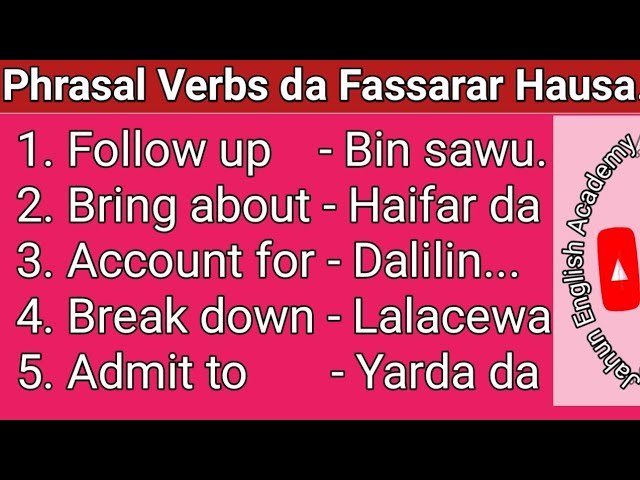
Translating English to Hausa can be a daunting task, but with “fassara turanci zuwa hausa,” it becomes simpler than ever. Dive into a world where language barriers dissolve, connecting people and cultures effortlessly. Unlock the key to effective communication and understanding. Stay tuned to uncover the magic of “fassara turanci zuwa hausa.”
The Power of Fassara Turanci Zuwa Hausa: Bridging Cultures Through Language
Welcome, young learners, to an exciting journey into the world of language! Have you ever wondered how people from different parts of the world communicate with each other? Today, we are going to dive into the fascinating realm of Fassara Turanci Zuwa Hausa, a unique process that allows for the translation of English to the Hausa language. Join me as we explore the wonders of language translation and the magic it brings in connecting people across diverse cultures.
The Beauty of Hausa Language
Before we delve into the intricacies of Fassara Turanci Zuwa Hausa, let’s first appreciate the beauty of the Hausa language itself. Hausa is one of the most widely spoken languages in Africa, predominantly in countries such as Nigeria, Niger, Ghana, and others. It has a rich history and is known for its unique blend of tones and sounds that give it a musical quality.
Learning about the Hausa language opens up a whole new world of culture, traditions, and stories. It allows us to connect with people from diverse backgrounds and gain a deeper understanding of their way of life. Language is not just a means of communication; it is a gateway to empathy and cultural appreciation.
Understanding Fassara Turanci Zuwa Hausa
Now, let’s turn our attention to the fascinating process of Fassara Turanci Zuwa Hausa. Fassara means translation, Turanci is English, and Hausa refers to the Hausa language. Put together, Fassara Turanci Zuwa Hausa is the act of translating English text into the Hausa language, allowing speakers of both languages to understand and engage with each other’s ideas and stories.
The Role of Translators
Translators play a crucial role in the Fassara Turanci Zuwa Hausa process. These talented individuals possess a deep understanding of both English and Hausa languages, allowing them to accurately convey the meaning and nuances of the original text. They act as bridges between two worlds, ensuring that nothing is lost in translation.
Translators must not only have strong linguistic skills but also cultural awareness to capture the essence of the text they are translating. Through their work, they promote cross-cultural understanding and harmony, enriching the lives of people who may not have had the opportunity to interact otherwise.
The Impact of Fassara Turanci Zuwa Hausa
The impact of Fassara Turanci Zuwa Hausa goes beyond mere communication. It promotes diversity, inclusion, and mutual respect among people of different linguistic backgrounds. By breaking down language barriers, it fosters collaboration, knowledge sharing, and friendship across borders.
Imagine a world where you can read your favorite English storybook in the Hausa language or watch a Hausa movie with English subtitles. Thanks to Fassara Turanci Zuwa Hausa, this dream becomes a reality, allowing for the exchange of ideas and cultures in a seamless and meaningful way.
Learning Fassara Turanci Zuwa Hausa
Are you curious to learn more about Fassara Turanci Zuwa Hausa and how you can participate in this exciting process? Whether you are a budding linguist or simply a language enthusiast, there are many ways to get involved and explore the world of translation.
One way to start is by practicing basic translation exercises from English to Hausa. You can begin with simple phrases and gradually move on to more complex sentences. There are also online resources and language learning apps that can help you improve your translation skills and vocabulary.
Additionally, you can reach out to local language clubs or cultural organizations that focus on Hausa language and translation. Joining these groups can provide you with valuable insights, networking opportunities, and a supportive community of language enthusiasts.
As we conclude our exploration of Fassara Turanci Zuwa Hausa, I hope you have gained a newfound appreciation for the power of language in connecting people and cultures. Language is a tool for understanding, empathy, and unity, and through translation, we can break down barriers and build bridges of communication.
So, young linguists, keep exploring, learning, and sharing the magic of Fassara Turanci Zuwa Hausa with the world. Who knows, maybe one day you’ll become a talented translator yourself, spreading the joy of language and culture wherever you go. The possibilities are endless when we open our hearts and minds to the wonders of language!
Yanda zaka Fassara turanci zuwa Hausa cikin sauki 2021 (New & Trick) Google 📲
Frequently Asked Questions
What is the importance of translating English to Hausa?
Translating from English to Hausa helps bridge the communication gap between speakers of the two languages. It enables non-English speakers to access information, content, and services in their native language, facilitating better understanding and inclusion.
How can I ensure an accurate English to Hausa translation?
To ensure accuracy in translating English to Hausa, it is essential to engage professional and experienced translators familiar with both languages. Providing context, glossaries, and reference materials can also help in achieving a precise and faithful translation.
What are the common challenges faced in translating English to Hausa?
Some common challenges in translating English to Hausa include capturing the nuances and idiomatic expressions unique to each language, ensuring cultural sensitivity, and maintaining the original meaning while adapting the text to the target language’s structure and style.
Final Thoughts
In conclusion, translating English to Hausa, known as “fassara turanci zuwa Hausa,” is a valuable skill for bridging communication gaps. This process requires linguistic expertise and cultural understanding to convey the intended message accurately. By mastering this translation, individuals can promote cross-cultural understanding and connect with a wider audience. Embracing the art of “fassara turanci zuwa Hausa” opens up new opportunities for effective communication and meaningful interactions.



